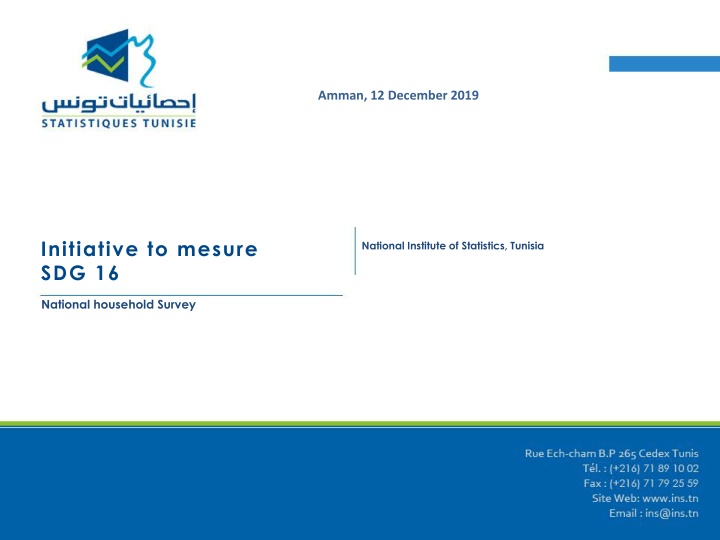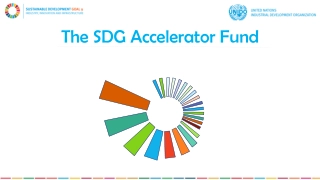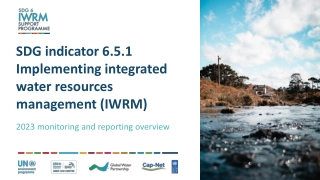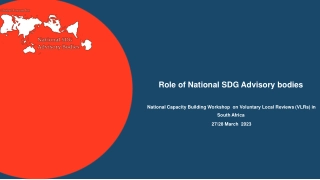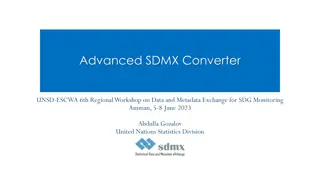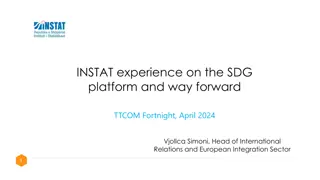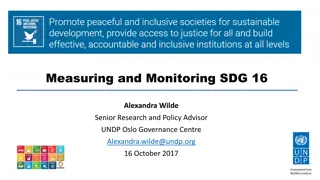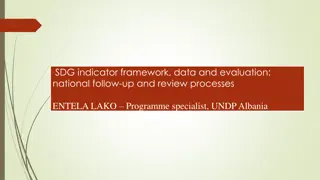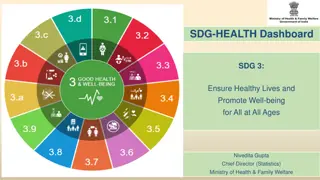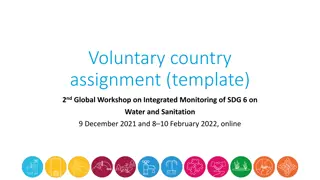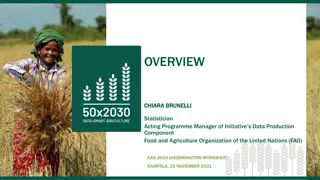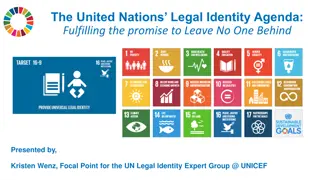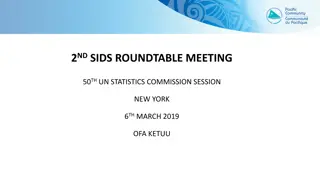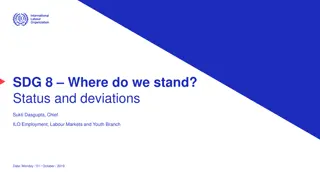Initiative to mesure SDG 16
National Institute of Statistics and UNDP collaborated on a national citizen survey in Tunisia, aiming to enhance local governance, promote citizen engagement, and reduce regional disparities. The survey provides strategic recommendations for strengthening democratic governance and tools for monitoring governance, peace, and security.
Download Presentation

Please find below an Image/Link to download the presentation.
The content on the website is provided AS IS for your information and personal use only. It may not be sold, licensed, or shared on other websites without obtaining consent from the author.If you encounter any issues during the download, it is possible that the publisher has removed the file from their server.
You are allowed to download the files provided on this website for personal or commercial use, subject to the condition that they are used lawfully. All files are the property of their respective owners.
The content on the website is provided AS IS for your information and personal use only. It may not be sold, licensed, or shared on other websites without obtaining consent from the author.
E N D
Presentation Transcript
Amman, 12 December 2019 Initiative to mesure SDG 16 National Institute of Statistics, Tunisia National household Survey
01 Content 1. Context and Objectives 2. Design and methodology 3. Modules 4. Disagregation 5. Some key results 6. Learned Lessons 7. Further step 8. Conclusion
02 Context and Objectives Decentralize Develop strategy to enhance local governace SDG s 16 Promote Citizen engagement indicators Governance Specify citizen needs at Reduce region disparity local level Monitoring & Evaluation
03 Context and Objectives National Institute of Statistics and UNDP partnered in developing a national citizen survey, the first in its kind in Tunisia, in 2014, The project conceived as a part of regional initiative focusing on transitioning countries (UNDP) and SHaSa-GPS initiative ( Strategy for Harmonization of Statistics in Africa on Governance, Peace and Security, Tunisia is member of Praia Group ( Africa) Tunisia was one of the five pilot countries of the UNDP initiative to pilot Rule of Law illustrative work on Governance within the framework of the SDGs. Instit ution s Civil society
04 Context and Objectives The Survey aims to : Establish better understanding of local governance Explore the dynamic between state and non-state actors in governance and social benefits, Develop strategic recommendations for strengthening democratic governance at local level, Respond the needs of Tunisian pilot Governance SDG Provide tools for measuring, monitoring and assessing Governance, Peace , and Security.
05 Design and Methodology October 2021: Planned, Financed by Tunisian Government Octobre 2017 : Financed by Tunisian Government Octobre 2014::Financed by UNDP
06 Design and Methodology Title: Citizen Perception for Peace, Liberties and Local Governance Representativeness: National and Regional level (7 big regions), Urbain/Rural Targeted population: aged 18 years and above Sample size: average of 4800 households ( 10.000-12.000 persons) Sampling frame: Census Data Collection period : September October ( 2014, 2017, 2021, ) Establishment of : National committee :national stakeholders to identify country priorities Technical Committee: conceptualize and implement the survey
06 Modules Questionnaire modules: 1. individual charecteristics 2. Engagement in civil society and political participation 3. Perception for freedom, humain rights, discrimination in Tunisia 4. Perception for public health and social protection services at local level 5. Perception for public education services at local level 6. Perception to peace and security at local level 7. Perception for administration, judiciary and tax collection and customs authorities other services at local level 8. Perception and satisfaction of local authorities 9. Perception for corruption at local level Three sets of indicators adopted: Objective, Capacities, Perception
07 Disaggregation All indicators are disaggregated by: Gender Age Level of Education Professional status Urbain / rural 7 Big regions Provide larger apportunities for tabulation and analysis
08 Some key Results Corruption in health sector Limited participation of youth in politics and civil society activities About 90% of citizens are not engaged in activities in their localities The parliament, the civil society consider survey results for monitoring and evaluation of the government effort to fight corruption
09 Some key results: Discrimination (16.b.1 ) Citizens perception towards discrimination by ground (survey 2017) 3% skin color 26% 7% Gender 34% 2% Handicap 31% 3% Politic membership 49% 13% Region 62% 20% Economic Situation 80% reported having personnally felt discriminated during the last 12 months Perception towards the discrimination
10 Some key results: Governance (16.6.2.a) Proportion of the citizens satisfied with their last experience of hospital services (survey 2017) 12% 30% 58% satisfied not satisfied not satisfied at all
11 Some key results: Governance (16.5.1) Proportion of persons who paid a bribe to a public official, during the previous 12 months is 11% Distribution of Citizens who paid a bride by revenu 1% 30% 28% 12% 29% less 500 DT 500 - 1000 DT 1000-2000 DT More than 2000 Refusal
12 Some key results: Violence (16.1.3.a) Proportion of victims of violence ( physical) in the previous 12 Proportion of victims of violence in the previous 12 months 2.5% Yes : 65% No: Reporting to competent authorities 35% Yes: No: Satisfaction 55% 45%
13 Lessons Learned Citizen show interest in responding in such kind of surveys and look forward to see results concretization, Enthusiasm of citizen for being consulted and expressing their point of view, Gather suggestions from citizen to promote the life at local level Citizen concerns at local level is different from governorate (24 governorate) to another, having a larger sample to produce results at governorate level is one of the capital recommendations for future surveys NSO s should begin courageously collecting and producing data on governance, peace and democracy, to improve and assess democratic processes
14 Further Steps Ongoing: Pilot Survey in the governorate of Tataouine (South of Tunisia) to test the SDG s 16 survey modules proposed by UNDP. 2020: integration of extra modules to bridge SDG 16 data gaps ( learned lessons from the pilot survey mentioned above) . October 2021: Implementation of the national survey
15 Conclusion NIS Tunisia is leader in producing Governance, Peace and Democracy statistics at national level: undetaken a national survey on local governance NIS Tunsia is leader in piloting the Africain initiative : SHaSa-GPS initiative NIS is the president of the elected bureau of the STG GPS created by AU NIS will provide statistics and indicators to work on Governance within the framework of the SDGs. NIS Tunsia ready to share her experience with the other NIS, as a step to encourage NIS s producing statistics on governance , Peace and Democracy. Producing tools to measure governance, peace and democracy is capital for decision makers
